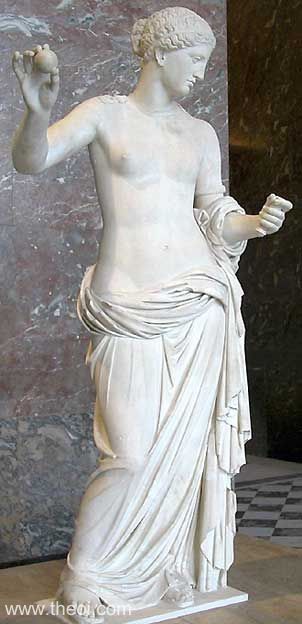Post by Nox on Jun 22, 2016 12:05:38 GMT
APHRODITE
Aphrodite Acidalia, Cytherea, Cypris

Rules over: Love, beauty and sexuality
Sacred animals: Doves, sparrows, horses, swans
Sacred plants: Myrtle, rose
Day of the week: Friday
Planet: Venus
Element: Water
Suggested offerings
Incense, fruit (particularly apples and pomegranates), flowers (particularly fragrant roses), sweet dessert wine (particularly Commandaria wine from Cyprus), and cakes made with honey.
Family members
Uranus or Zeus and Dione, depending on the origin
Short biography
As with many ancient Greek deities, there is more than one story about her origins. According to Hesiod's Theogony, she was born when Cronus cut off Uranus's genitals and threw them into the sea, and she arose from the sea foam (aphros). According to Homer's Iliad, she is the daughter of Zeus and Dione. According to Plato (Symposium, 180e), these two origins were of entirely separate entities: Aphrodite Ourania and Aphrodite Pandemos.
Aphrodite is consistently portrayed, in every image and story, as having had no childhood, and instead being born as a nubile, infinitely desirable adult.
According to one version of Aphrodite's story, because of her immense beauty Zeus fears that the other gods will become violent with each other in their rivalry to possess her. To forestall this, he forces her to marry Hephaestus, the dour, humorless god of smithing. In another version of the story, his mother, Hera casts him off Olympus, deeming him too ugly and deformed to inhabit the home of the gods. His revenge is to trap his mother in a magic throne. In return for her release, he demands to be given Aphrodite's hand in marriage.
Additional notes/warnings
-
Sources
en.wikipedia.org/wiki/Aphrodite
Aphrodite Acidalia, Cytherea, Cypris

Rules over: Love, beauty and sexuality
Sacred animals: Doves, sparrows, horses, swans
Sacred plants: Myrtle, rose
Day of the week: Friday
Planet: Venus
Element: Water
Suggested offerings
Incense, fruit (particularly apples and pomegranates), flowers (particularly fragrant roses), sweet dessert wine (particularly Commandaria wine from Cyprus), and cakes made with honey.
Family members
Uranus or Zeus and Dione, depending on the origin
Short biography
As with many ancient Greek deities, there is more than one story about her origins. According to Hesiod's Theogony, she was born when Cronus cut off Uranus's genitals and threw them into the sea, and she arose from the sea foam (aphros). According to Homer's Iliad, she is the daughter of Zeus and Dione. According to Plato (Symposium, 180e), these two origins were of entirely separate entities: Aphrodite Ourania and Aphrodite Pandemos.
Aphrodite is consistently portrayed, in every image and story, as having had no childhood, and instead being born as a nubile, infinitely desirable adult.
According to one version of Aphrodite's story, because of her immense beauty Zeus fears that the other gods will become violent with each other in their rivalry to possess her. To forestall this, he forces her to marry Hephaestus, the dour, humorless god of smithing. In another version of the story, his mother, Hera casts him off Olympus, deeming him too ugly and deformed to inhabit the home of the gods. His revenge is to trap his mother in a magic throne. In return for her release, he demands to be given Aphrodite's hand in marriage.
Additional notes/warnings
-
Sources
en.wikipedia.org/wiki/Aphrodite
